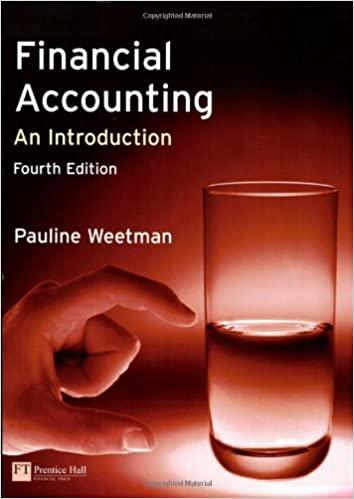Question
(g) A review by the chief accountant on 1 July 2016 revealed that no balance date adjustment had been made in relation to lease of
(g) A review by the chief accountant on 1 July 2016 revealed that no balance date adjustment had been made in relation to lease of the machinery. The company paid $620,000 on 1 January 2016 to lease the machinery for one year (i.e. until 31 December 2016). This is an operating lease (i.e. expense recognised as accrued).
(h) On 30 June 2016 the directors decided to transfer $8,000,000 from retained earnings to the general reserve.
(i) Directors declared a final dividend on the 30 June 2016 of 11 cents per share. This required no further approval or authorisation and was expected to be paid on 10 September 2016.
(j) On 5 July 2016, the Australian Competition and Consumer Commission (ACCC) notified the company that they were investigating a number of complaints from customers. During the second half of the year ending 30 June 2016, as part of a new marketing strategy, the company had held a number of supersale events where a range of products were marked down by 80% for a short period (often for 24 hours only). However many customers had complained to the ACCC that when they tried to purchase the products at the discounted price, they were told no sale stock was available, and purchased the products at the regular (i.e. undiscounted) price. The companys lawyers have advised that they believe that the company will be directed by the ACCC to compensate/refund all customers who purchased at the regular price during the periods of these supersale events (this is expected to cost the company $480,000). Further, there is a 60% probability that the company will also be fined by the ACCC. It is estimated the fine imposed would approximate $85,000. The ACCCs investigation is expected to be completed in October 2016.
(k) On 10 August 2016 there was a flood that damaged one of the companys buildings and also the inventory/stock stored in that building. The estimated cost of repairing the building is $870,000. The cost of stock damaged (which needed to be destroyed) was $1,200,000. The companys insurers have advised that the current insurance policy does not cover damage from flood. Given this, on 30 August 2016, the Directors reviewed the companys insurance coverage and increased the insurance cover to include flood damage. This will increase insurance expenses by 12% in the year ending 30 June 2017.
(l) The company tax rate is 30%. Ignore tax-effect accounting. Tax expense should be based on 30% of the accounting profit before tax. No tax expense has yet been recorded
what are the adjustments for these
Step by Step Solution
There are 3 Steps involved in it
Step: 1

Get Instant Access to Expert-Tailored Solutions
See step-by-step solutions with expert insights and AI powered tools for academic success
Step: 2

Step: 3

Ace Your Homework with AI
Get the answers you need in no time with our AI-driven, step-by-step assistance
Get Started


